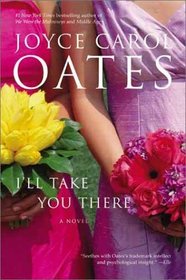Helpful Score: 2
Didn't like it at all. Stuck with it until I reached about 100 pages and I realized I was just torturing myself.
Helpful Score: 1
A serious, brooding look at an intellectual college girl. Well crafted in haunting language. Distinctively Oates.
Yhis story is not one of JCO's strongest, but is still a pretty good read.
I am never disappointed with Joyce Carol Oates books and this was no exception.
typical straighforward Oates
This book, about an immature college student, was one of the most nuanced, complicated, adult books I have ever read. While reading it, I was unsure if I had picked up a novel or a memoir. As it turns out, it is a bit of each.
Knowing that Oates is writing about herself makes the reader's relationship to the novel more complex. Oates does not seem to like her protagonist much, and we are not invited to like or admire her, either. She drags the protagonist kicking and screaming out of her own head and into adulthood, and she does it without sentimentality, pity, or even mercy.
Although the protagonist engages with philosophy at a level few of us will achieve, she doesn't even begin to understand her own experiences. She doesn't understand the people around her, and she is unable to understand herself in context. She makes mistakes that make the reader cringe, and at times I even felt a little queasy. Partway through, I put the book down for several weeks. Oates is unflinching in her examination of the protagonist's thoughts and experiences, and this is not an easy read. But that is appropriate, because (in my experience) people who are so smart with ideas and so dumb about people tend to suffer quite a bit before they figure things out.
The main question I had at the end of the novel was whether the protagonist had matured enough to deserve Oates' love. I think she must have, because otherwise the novel would be incomplete. Also, the ending implies that the protagonist has matured. Hugs to all of us who used to be smart but innocently awful, and what we went through to get better.
Joyce Carol Oates is a superstar author. Her material may be difficult, but her skill makes the reading wonderful. This novel made me uncomfortable, but of course it was absolutely worth it. Recommended.
Knowing that Oates is writing about herself makes the reader's relationship to the novel more complex. Oates does not seem to like her protagonist much, and we are not invited to like or admire her, either. She drags the protagonist kicking and screaming out of her own head and into adulthood, and she does it without sentimentality, pity, or even mercy.
Although the protagonist engages with philosophy at a level few of us will achieve, she doesn't even begin to understand her own experiences. She doesn't understand the people around her, and she is unable to understand herself in context. She makes mistakes that make the reader cringe, and at times I even felt a little queasy. Partway through, I put the book down for several weeks. Oates is unflinching in her examination of the protagonist's thoughts and experiences, and this is not an easy read. But that is appropriate, because (in my experience) people who are so smart with ideas and so dumb about people tend to suffer quite a bit before they figure things out.
The main question I had at the end of the novel was whether the protagonist had matured enough to deserve Oates' love. I think she must have, because otherwise the novel would be incomplete. Also, the ending implies that the protagonist has matured. Hugs to all of us who used to be smart but innocently awful, and what we went through to get better.
Joyce Carol Oates is a superstar author. Her material may be difficult, but her skill makes the reading wonderful. This novel made me uncomfortable, but of course it was absolutely worth it. Recommended.
JCO introduces her readers to a fascinating woman in this novel. She is desperate to fit into almost any place that will have her; she seeks identity, companionship and a sense of belonging that has eluded her all of her life. As is often the case, our greatest strength may also be our greatest detriment. "Annelia's" intellectual pursuits and abilities lead her to seek definition through another character, Vernor, who uses and discards her just as her sorority did. I felt intense compassion for Annelia in her quest for friendship and belonging. Often the most vulnerable among us are those most victimized: which comes first? I found the philosophical quotations and discussions that weave through this book in increasing frequency to be an integral part of the exploration of the initiation into adulthood.




